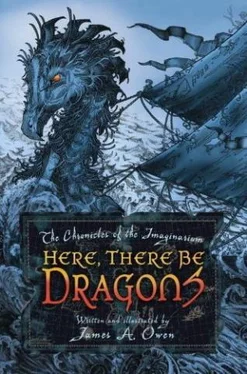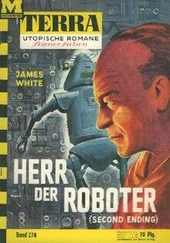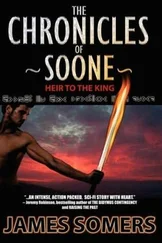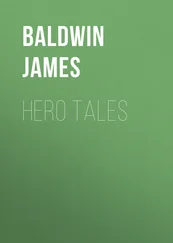Ordo Mass and the seven men—all his sons—led the companions through the thickly forested trail to a small compound of pale-wooded cottages in the center of the island, trailed by cats all the while.
“Interesting homes,” said John. “Were they made of wood from another part of the island? It doesn’t look like any from the trees we passed.”
“Our original ship was quite large,” said Ordo Maas, “and we never expected to use it again, not in the same manner we originally did. So we used the timbers from its hull to build our homes, and one or two other useful things.”
“That’s an understatement,” said Bert, “if the rest of the legend of Byblos is true.”
“There are lots of legends,” said Ordo Maas, “but yes. What you’ve heard is true.”
“What are you talking about?” said John.
“He built the ships,” said the youngest son. “All of them.”
“Hap,” Ordo Maas chided. “Do not be boastful.”
“Ships?” said Charles. “You mean the Dragonships, don’t you? Did you really build them?”
“My sons…came across a small, badly battered boat.”
Ordo Maas nodded, a small smile playing at the corners of his mouth.
“I, and my children.”
“Your sons?” said John.
“I have many children, but these seven are those who helped me, in the beginning, to build the first of what you call the Dragonships, yes.”
The companions (plus Magwich) were shown to an expansive room in the largest cottage, where they sat on overstuffed cushions scattered across the floor. Jack noticed that the cushions smelled slightly of livestock—a thought that went with the fact that the broad double doors were large enough to admit a horse, or more likely, a lion.
The house was plain, but in a manner that was simple rather than drab. Ordo Maas’s sons served them cups of hot tea and a platter of bread thick with pepper, which they needed little encouragement to devour. They noticed that dozens of saucers of tea—several of which were already being attended to by the cats that had followed them—had also been set along the walls.
The companions were curious as to what Ordo Maas would say about the Dragonships, but they held back from asking for details while their host was so graciously serving them. And to be honest, they were grateful for the respite and sustenance, stretching luxuriously on the cushions and drinking a large quantity of tea.
Once the companions had sated their hunger and thirst, the dishes had all been cleared away, and everyone was comfortably settled, Ordo Maas began his tale.
“A very, very long time ago, when this world and your own were much younger, and not so different, the boundaries between them were as gossamer, and could be freely passed.
“I traveled to the lands herein often, most frequently to those islands now called the Drowned Lands, but then, we lived in your world—”
“Where father was a very wise king,” interjected Hap.
“Where I was already very old,” Ordo Maas continued, “and was relied on to remember things that others had forgotten. I discovered that the world would soon be engulfed in a cataclysm. It would be covered in water, in a great flood that would last for a year, and many of the empires that then existed would be destroyed.
“I was mocked by the other elders and forbidden to reveal my beliefs to any over whom we ruled, nor to take steps to protect myself and my beloved wife. So, under the cover of darkness, we fled to a vast desert, and it was there that she and I began our family. And together, my sons and I started to build a great ship. It took us many years, but finally, it was complete, and we started to gather into it all the things that would be needed to rebuild the world.”
“This sounds very familiar,” said Jack.
Charles nudged him. “Don’t interrupt. Keep good form, Jack.”
“It should sound familiar,” said Ordo Maas. “The gods have been destroying mankind by flood since time began. It was necessary until the point that men had learned enough to begin destroying themselves all on their own.
“To begin on the paths of the gods, one must first perfect one’s weaknesses.
“When the ship, which we called the ark, was complete, we took into it the power of the gods, which had been stolen from them by my father, to be given to me, so that when we once more emerged into the world, we would begin with one of their strengths.”
Ordo Maas gestured with his staff, and the flame danced with movement. “He brought it from the home of the gods with his own hands, and ever since, it has never left mine,” he said. “And, when someday I must pass, as all things do, into the Summer Country, I shall give it on to my own sons.”
“We also had with us one other object of power, the last great gift of our gods—given, we believed, to aid us in rebuilding the world. But it was a burden as much as a gift, and more than one man—or woman—could be expected to bear.
“As I was given Fire, so that we could make tools, so was my wife given a gift: a great kettle of iron, emblazoned with the symbols of Creation, lidded with the shield of Perseus, and sealed with wax.
“We were told that within the kettle were the Talents of Man—everything necessary for the world to be reborn when the great waters of the flood receded—and that it must never be opened until the world was prepared. But, believing ourselves to be the equals of the gods, we did not listen. She opened the seal, and the world paid a heavy price—for within were not only the Talents of Man, but all of the Vices as well. All the evils of the world, held captive in the kettle, and freed by a moment’s hubris.”
He sighed heavily, and one of his sons placed his hands on Ordo Maas’s shoulders.
“She was cast from the Archipelago,” the ancient man continued, “and the kettle was given into the safekeeping of another. Not,” he added, “that we believed such a caution would be a permanent remedy—for it is the mandate of Men to seek after change. Even if that change is not for the better.
“But I digress—I was telling you about the ships,” said Ordo Maas. “When the flood had passed, we found ourselves here, on the island we came to call Byblos. Much of the geography of the world had been changed—but the Archipelago had remained largely unaffected by the flood, and we came to realize that it was not truly a part of the world from which we had come. Connected, but not in full.
“The Frontier had protected the lands herein and had barred passage during the flood to all vessels but our own. It was the Flame, you see,” he said, pointing to the staff. “It was a living manifestation of divinity, and it was what allowed passage through to the Archipelago.
“In time, as the world began to heal, our children began to cross back and forth, sometimes successfully, others, less so. That was how I realized what it was that had allowed the passages, and I determined that I would try to create another ship that might pass freely throughout any waters in which it was guided.
“In time I came across a shipwreck—a ship from your world, which nevertheless had that touch of divinity. And I rebuilt it, slowly, laboriously, and then made a gift of it to a distant descendant.”
“The Red Dragon,” Bert said. “That was the Red Dragon.”
“Yes,” Ordo Maas said, nodding. “The first of the Dragonships. There had been a masthead sculpted to its prow, which had been battered away in a storm. And so when I remade it, I fashioned it after the protectors of the Archipelago, the bearers of divinity in this world—the dragons.
“It seemed appropriate that those ships that followed after were not constructed wholly new, but were instead rebuilt from ships that had already seen much service—ships that had a soul, so to speak.
“Then, more than a thousand years later, when it seemed that the world was on the edge of destroying itself yet again, a great king came to the Archipelago—Arthur Pendragon.
“Arthur had the ability to command the dragons—the protectors of the Archipelago and guardians of the Frontier—and also had created a great empire in your world. It was an opportunity to reunite the two worlds under a protector who would rule with wisdom and strength. And so with him, and him alone, I shared the secret of the Dragonships that I had created.”
“Begging your pardon,” said Charles, “but after a buildup like that, I do hope you’re going to share it with us, too.”
“Their eyes,” said Ordo Maas. “The Golden Eyes of the Dragons are what allow passage between the worlds.
“I tell you this now, because you are the Caretakers of the Imaginarium Geographica, and as such, would have use of one of the ships—the Indigo Dragon, I believe. So how is it that you came to be floundering without her, in the waters near my home?”
“That,” said Bert, “is where our story begins.”
And, with occasional contributions from the others, Bert told Ordo Maas all that had happened.
Читать дальше











